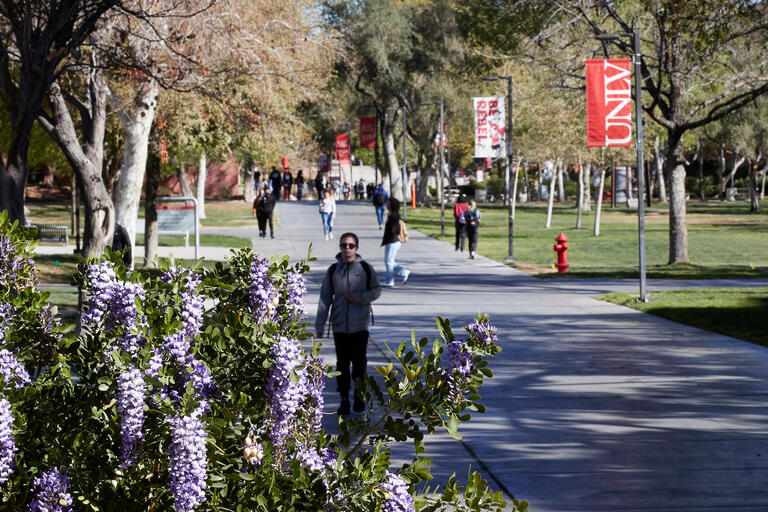Performing at a Los Angeles cabaret theater in his 20s, Michael Bruner was struck by the power of language. Memorizing poetry for staged productions and watching the audience react emotionally motivated him to understand how language affects what we think about ourselves and society. He became a freshman at age 30 at Santa Monica College and went on to get his master’s and Ph.D. degrees. As a professor, he specializes in public argumentation, the ethics of persuasion, and communication tactics used in political movements. He joined UNLV in July as the new chair of the department of communication studies.
Where did you grow up?
I was born in Kansas City, Missouri. I grew up on a family farm. My favorite thing to do was clear land. It would take six months to clear an acre by hand. There were a lot of blisters on my hand. It taught me that hard work pays off, and you have to take one step at a time. It taught me that things that last take time to build.
What inspired you to get into your field?
When I was on stage, I realized the power of words. We would say something funny, then tragic, and see the audience go from laughter to sorrow. You can find ways to mobilize public sentiment and that fascinated me.
How does your performance background influence your teaching?
Teaching is not performance in the sense of entertainment, but there is certainly a performative aspect when it comes to developing the ideal atmosphere for classroom learning. One service I hope communication studies faculty can eventually provide is in helping faculty across campus to learn more about maximizing "classroom performance."
What is the biggest challenge in your field?
People do not understand what rhetoric means. Rhetoric is the art of persuasion. People think rhetoric is the use of language to solely manipulate people. It can be manipulative, but it can also be speech that is used to reach wise and ethical solutions in public affairs. A republic requires critical citizenship. There are ethical forms of persuasion that empower others versus unethical forms of persuasion that manipulate others.
What about UNLV strikes you as different from other places you have worked or where you went to school?
I went to graduate school in Baton Rouge, Louisiana, and Seattle and I taught for 15 years in Atlanta. Living in the Mohave Desert is quite a change. But what are most interesting to me are the boundless opportunities for innovation. Las Vegas only had tens of thousands of residents less than 60 years ago, and now it is well over two million. That sort of fast growth provides opportunities you just can’t find in more “settled” parts of the United States.
Any tips for success?
Find your passion. Devote your freedom to it. Cultivate your talent and work hard to make work fun. Use what you have to do to set the stage for what you want to do.
Finish this sentence, "If I couldn't work in my current field, I would like to ..."
Become a psychotherapist. Far too many people suffer from depression and other mental afflictions, and I think being a “doctor” of communication is somewhat similar to being a doctor for those who have suffered from poor communication, miscommunication, and hateful communication.
Tell us about a time in your life when you have been daring?
Being daring for me means being able to move. I moved at 22 from small town Missouri to Los Angeles with $300 and a dream to my name. It was also daring that I came here from my lovely job as a research professor in Atlanta. I’m the most daring when I see opportunities I can’t say no to.
Pastimes or hobbies?
Creating poetry. There’s a certain liberating process with poetry; it liberates consciousness. My hobby is my research because I love my work. When you can make your work fun, then what’s better than that?



